Patience, commitment and courage, for the protection of migratory birds
40 years since CABS' creation
Published in Komitee-Zeitschrift Artenschutzbrief (CABS magazine), April 2015
In the mid-1970s, information about the extent of migratory bird hunting in Italy reached Germany. Many pictures of hunters with mountains of shot birds where circulating. A small group of bird conservationists decided to take action and founded in 1975, the Komitee gegen den Vogelmord (German name for Committee against bird slaughter).
1975-1979 "No vacation where birds are murdered"
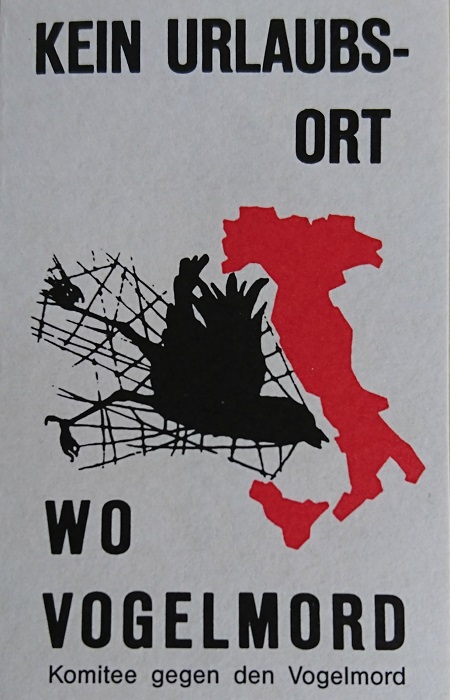
The scale of bird hunting in Italy is deeply disturbing. But how to tackle over two million hunters and trappers across the mainland and islands such as Sicily? Italy was one of the most popular tourist destinations amongst Germans at that time, so the answer seemed obvious – we needed to form a tourist boycott! To put the facts in front of the eyes of tourists was a crucial move to be made.
CABS formed a campaign "No vacation where birds are murdered" to push the growing realisation that approving bird hunting is not a good poster child for a holiday destination in say, Rome. Everywhere, where foreign holidaymakers bring in the most significant source of income, the hunters are out. Plucked Robins and larks on show in marketplaces began to decline. On the Adriatic Sea, the first villages declared themselves as 'bird-murder-free zones' in 1977.
However, it was still apparent that the call to boycott alone is not enough. Education and better laws were sorely needed. So, extensive campaigns were agreed with the local partners. During these years, everything stemmed from our fledgling conservation movement in Germany, our Italian partner became our "Cultural export" if you will, to deliver the messages from a local perspective: in the form of pamphlets, demonstrations and conferences funded via donations in Germany more and more alliances could be forged. Under growing International pressure Italy amended their hunting act in 1978 which saw numerous wild bird species placed under statutory protection, as well as shorter hunting seasons and a ban on hunting in protected areas being introduced.
But we want more. It was common knowledge amongst the conservation community that hunting and trapping of wild birds was an issue not just confined to Italy, but everywhere across Europe. A scheme for the whole continent was urgently needed – the European Union was the second major scene for our work. With lobbying and campaigning to promote the true situation of migratory wild bird hunting across Europe, CABS were integral in influencing the hunting related details of EU Birds Directive which was implemented in 1979. This laid the way for a more comprehensive legal framework to protect both birds and nature as a whole throughout Europe.
1980-1984 Fake rings and protected Wetlands
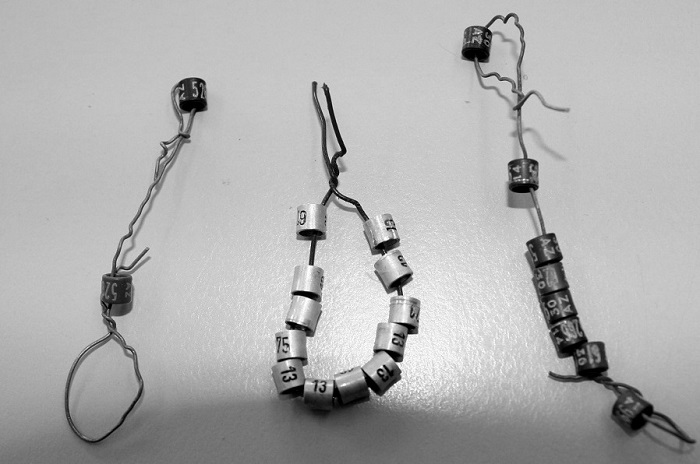
The Committee (CABS) is growing fast. In 1980, we launched a campaign against bird trapping in Belgium and in 1981 the migratory bird hunting in the German Wadden Sea became a particular focus. In addition to this we campaigned against the annual pigeon shooting contest in Florence (Tuscany), in which during a single weekend, 3,000 pigeons were shot down by "Sport shooters", our protest led to a ban on this massacre in 1984.
Captive finches are used as cage birds in Germany. In addition to the Italy campaign, most of our energy during the early eighties focused on the issues around the wild bird trade. In Germany, there are many bird lovers who not only captive breed domestic finches as ‘exchange birds’ but trapping of wild birds with nets was/is also prevalent. The catch is even allowed in part, but only as a "blood refresher" of the breeding base to maintain genetic health in the captive populations. However, these ‘restrictions’ provide many bird breeders with a driver to fuel the pet trade. Goldfinches, Bullfinches, Hawfinches and Crossbills are all subjects to profitable business.
In order to put a stop to the illegal trade, CABS members undertook covert monitoring within the trading scene, buying birds as evidence and having the birds examined by experts to determine their origin. As came to light, the domestic market is almost swamped with wild birds. With counterfeit rings, the birds appeared ‘legal’ by their captors. Many of the finches bore injuries to their legs and toes where illegal traders forced narrow real rings onto the legs.
Many of the alleged farms were closed after a wave of ads and publicity, the federal countries enacted tougher laws, and pet shops voluntarily ceased selling native birds. In 1986, Germany adopted its first federal Nature Conservation Act which outlawed the trapping of wild birds - a great success for us at just over 10 years old!
CABS reserve "Raisdorf Wetlands"Migratory birds not only require safe migration routes, but also safe and suitable breeding habitat. A large inheritance/legacy donation enabled CABS to buy a reserve. The "Conservation Group Raisdorf" led a project to secure a wetland area east of Kiel. Adding to this in 1984, the complete area with a dozen waters was purchased. Hedges were planted, nest boxes hung, and using heavy plant scraps were created to benefit waders and wetland birds. The "Raisdorfer Krötenteiche" (“Raisdorf Wetlands”) are the core of CABS protected areas in Schleswig-Holstein, and will be safe for generations to come.
1985-1989 Bird Guards in danger
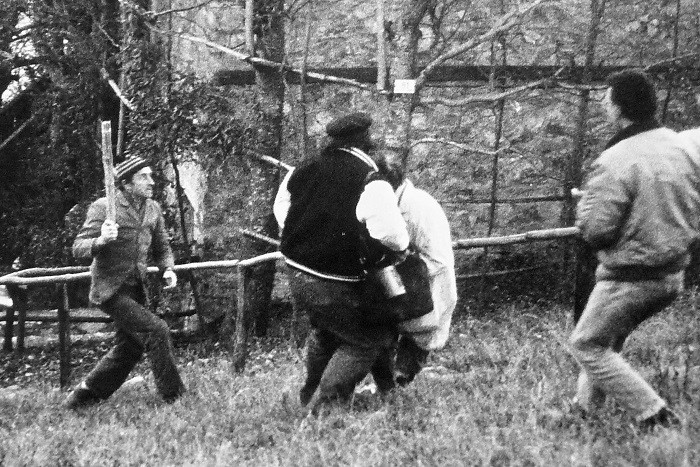
As many of our volunteers are aware, activist bird protection is an area not without risk. With the expansion of our migratory bird protection operations in Belgium and Italy, so escalated the violence. Having not been accustomed to resistance the bird trappers and hunters often respond very aggressively.
In Belgium CABS members regularly run the gauntlet during protest marches in Malmedy, Eupen, Verviers and around the German-Belgian border. Almost every weekend during the autumn saw skirmishes between conservationists and the hunting fraternity. Armed with whistles and sirens CABS members draw up along the border, where on the Belgian side poachers had set up nets and decoys as outlawed under the EU directive. A flocks of birds approached the conservationists noisy alarms trigger the birds to alter their path and therefore avoid the poachers’ nets. This was often met with extreme aggression from poachers armed with pitchforks attacking the demonstrators. Unperturbed the activists would regularly run into the Belgian territory amongst the chaos and take the nets and decoys. The main goal was always achieved: the media interest around this so called ‘Bird War’ brought the subject to the attention of the entire nation. The downside being a few broken noses, sore ribs, black eyes and even a few pot shots taken in our direction.
At the end of the eighties the mood against the trapping of wild birds began to shift in the right direction. The government of the neighbouring North Rhine-Westphalia put pressure together with the Belgians in favour of abolishing the ‘tradition’. In 1988, following an official environmental complaint from CABS, the European Court prosecuted the Belgian government for the violations of the EU birds directive.
1985 saw the first CABS bird protection camps in Italy: Initially, the main aim between the German and Italian NGOs was the dismantling and collection of illegal nets and trapping paraphernalia in Brescia. Police support as established since the late 90s was not available at the time and so dozens of our volunteers endured a number of hostile incidents of broken bones such as at the Colle San Zeno in 1987 and in Treviso Bresciano in 1988 (both Lombardy). Shattered windscreens and slashed vehicle tyres were the order of the day.
Given the professional manner with which the incidents were met, we received the accolade of the federal government. In 1987, Federal Environment Minister Klaus Töpfer acknowledged CABS as an official nature protection NGO. In line with public interests, this title authorised us to submit comments on nation-wide planning projects and be consulted on legislation.
1990-1994 The first successes
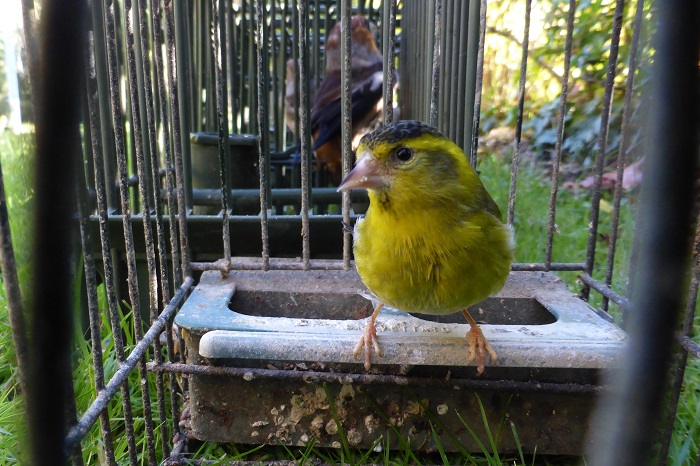
Belgium was perhaps a practice run for CABS bird protection campaigns: targeted actions in-situ, media and lobbying, building relations with the EU, the skillful use of casefile work and court proceedings and a great deal of patience. We have shown how a translucent project can be brought to success.
At the beginning of the 90s Belgium was finally ripe for the picking. In 1992, the Government significantly shortened the season – cut from eight weeks to only a month. The protests were unheard and in September 1993, bird trapping was completely prohibited! In just 9 years together with Belgian partners, CABS had shut down one of the strongholds for bird trapping in Europe.
In Italy, the campaign which had started in 1975 led to the first major stages of victory: 13 years after the adoption of the EU birds directive, Italy introduced a new hunting law in 1992. Many bird species - such as Brambling and other finches - were placed under nature protection, bird trapping with nets and traps was prohibited and the hunting season shortened to four months as well as outlawing the sale of shot birds.
In the 90s Italian local authorities began to allow the release hundreds of thousands of finches protected under EU law to hunt.Due to the restrictions of the new generations implementing laws on the Italian hunters – of the two million licensed hunters in 1995 just 900,000 remain. Nevertheless the hardcore hunting fraternity continue to cement their influence in Rome. With special permits for bird trapping and shooting of protected species the hunters have retained the rights which they lost back in 1992, more than two decades ago. There are also exemptions available for trapping of thrushes and larks, used for hunting decoys. Furthermore the shooting of Hawfinches and Bramblings is being reintroduced under flimsy reasons year after year.
In 1994 CABS filed a lawsuit in Milan against two of these ‘special’ permits. Administrative (Crown equivalent) Court of Lombardy agreed with our findings and called a stop to finch hunting and trapping. Making us loyal customers for over 20 year to the Administrative Courts. However, it’s the pro hunting regional governments which continue to issue new permits every year, even until the present day.
Whilst the legal battle over finches continues in Italy, the CABS wetland reserve in Schleswig-Holstein grew by 95 hectares in 1994 following the purchase of large areas in the Valley of the river Schwentine. And in the German Wadden Sea hunting is closed once and for all after 13 years of Committee campaign on 31.12.1994 hunting once and for all!
1995 - 1999 Autumn under palm trees and pines
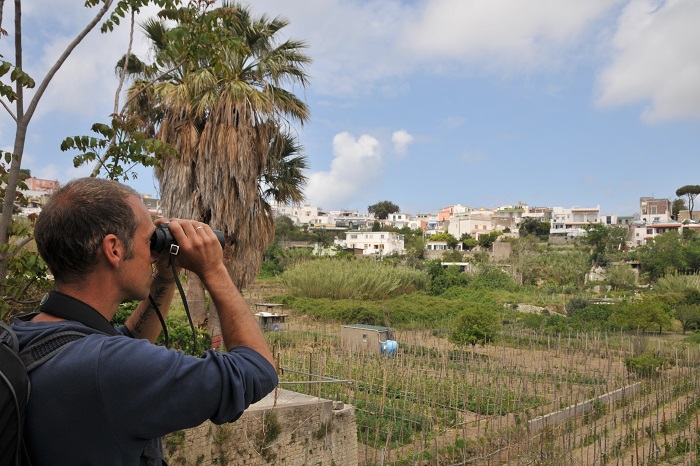
The resources freed up from the decade long focus in Belgium, allowed CABS to turn our focus to other areas of Europe in the latter half of the 90s. Operations began to develop in France and the South of Italy. With Germany, Belgium and Italy finally banning bird trapping and hunting, France showed no such ambition to protect rather than persecute wild birds. On the contrary: we observed widespread brutal methods such as horsehair snares, snap traps and limesticks being established in the name of tradition.
In 1996 CABS began extensive research in France. The extent of bird trapping with snares in the Ardennes is well documented along with Lapwing and Lark trapping with clap nets in the Champagne and Bordeaux regions. Later research found the extent of stone crush traps and limesticks being used across the south of France. The shocking results were presented in Brussels to serve as the basis for a number of environmental complaints to the European Commission. Petitions managed to gather hundreds of thousands of signatures against the bird slaughter in France. Unfortunately the long fight continues. Lack of support by French conservationists and clumsy EU proceedings against France in the European Court give the trappers continued breathing space. In 1997 thanks to our investigations trapping of Ortolan bunting was outlawed and restricted quota announced for Lapwing in the Champagne region. However, France continues to be the problem child of international bird conservation up to the present day.
An altogether different situation developed in southern Italy: since the early 90s the illegal trapping with snap traps has arisen on the coast and islands around Naples. Specifically targeted are species such as Whinchat, Nightingales and Redstarts. All species which are of conservation concern in Europe.
CABS began operations on the island of Ischia in 1993 and has expanded our resource there since 1996. CABS members and our Italian partner organisations also regularly undertake field operations on the small islands of Ponza, Capri and Procida as well as the world famous Amalfi coast. Initially thousands of traps were collected, but with continued good cooperation with the police the recorded incidents of poaching continue to diminish.
We are also active in Sardinia: since 1996 bird protection camps are held each autumn on the Mediterranean island and every time well over 10,000 illegal horsehair snares are removed.
2000 - 2004 Parrot conservation and goose hunter
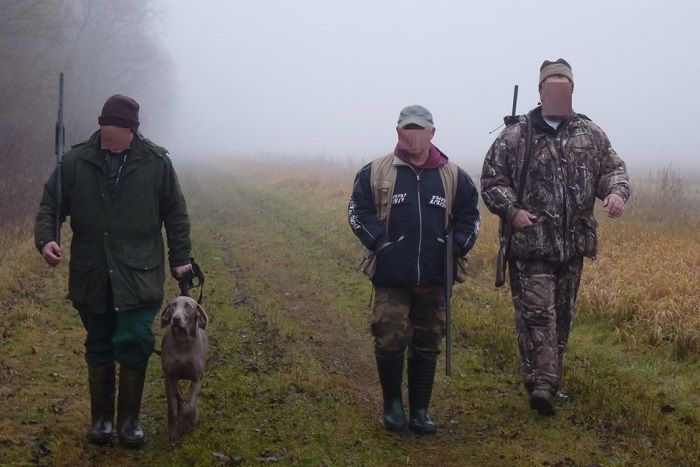
In the year 2000, the catching of birds in Germany is no longer an issue, today cage birds are caught in the tropics. Exotic birds – formerly luxuries - have become part of a globalised million dollar business. Wild caught parrots from South America, from Asia and African finches are available everywhere. Germany is one of the most important markets for parakeets and macaws which have been trapped in the Amazonian rainforest. Many birds die in transit, confined with >20 others in many instances. And legally, because only a small portion of species are available under international protection.
With privately financed trips CABS members travelled to the Amazon to witness and covertly film the first direct evidence of bird trapping in the South American rainforests, the middlemen involved in supplying the demand. The gruesome scenes run later on all German television channels. Having started the conservation campaigns in the 1980s our work was breaking new ground in the new millennium. It’s not just about birds: CABS staff cover the trafficking of reptiles, taxidermy and ivory and rhino horn trade. Monitoring of online auctioning amplified following a study we published in 2003 regarding taxidermy trade of protected species on eBay.
Our wild bird trade campaign started back in the 1980s ended with a bang in 2007 when the EU imposed a strict ban on bird imports of all kinds. Not for reasons of welfare or conservation but due to bird flu.
Meanwhile, another CABS project makes a splash: Following the fall of the wall hunters from the west had become increasingly established in large wetlands of Eastern Germany indulging in goose hunting without adequate government regulation. After the turn of the millennium, in 1997 accompanied with national media in the new federal states we publicised the issue leading to a calming of the situation. Whilst illegal hunts still take place to this day, in most protected areas the birds can live in peace.
In 2001 CABS began small operation in the spring to monitor the illegal hunting of migratory birds of prey and bird trapping with nets on Malta. CABS also helped fund an outboard motor to assist Maltese police in putting a stop to poachers hunting at sea.
2005 – 2009 Bird hunters at court
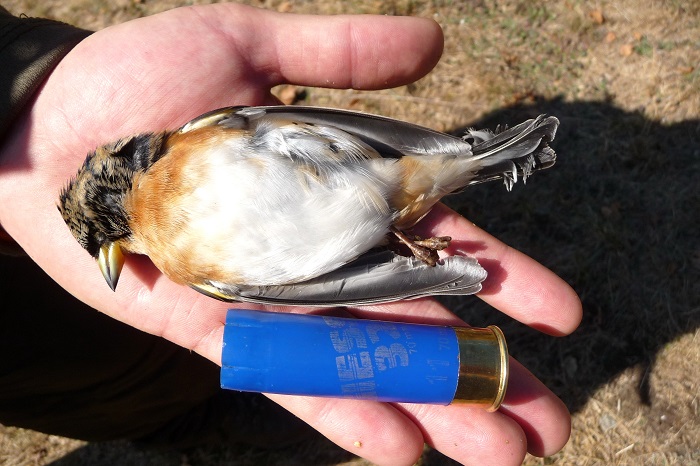
During the mid 2000s a breakthrough was achieved in Brescia Northern Italy: Instead of only dismantling active trapping sites we reached an agreement with local forest police to pass on field intelligence to assist the police in catching poachers red handed. In 2001 we still recovered around 12,000 bow traps. Following the joined up work with police the numbers of active trapping sites monitored plummeted to around 2,000 in 2009. Similarly in Sardinia poaching has rapidly reduced with the joined up cooperation with police.
Our successes transcend our fieldwork. Our lobbying actions launched in 1994 against the legal derogations for finch shooting and trapping finally came right. Every year we gain new processes to silence the guns and bring down the nets. Starting in 2006, we turned our communications to higher authorities. In 2008 our lawyers took an official complaint all the way to the Supreme Court of Italy to bring about an end of the ‘special’ permit and local exemptions. As a result of our actions the European Court condemned Italy in 2010 because of a continued breach of the EU Birds Directive. In 2013 an amendment of the national hunting act was passed and in 2014 the last trapping installations were closed for good – 39 years of tireless commitment paid off at last!
Judgement falls, not only in Italy. The illegal persecution of birds of prey has been on CABS radar since the late 1970s, but our active work based on increasing evidence of persecution did not start until 2005. Especially in the western parts of Germany where goshawks, buzzards and kites have been seen to be targeted. After our surveillance footage led to the conviction of a hunter from Duren in 2007, CABS has made bird of prey protection a key part of our central campaign within Germany. We aim to deliver better protection for the species suffering at the hands of hunters, gamekeepers and pigeon fanciers.
In 2007 the first major autumn bird protection camp started on Malta. Henceforth every autumn we have deployed around 30 conservationists and environmentalists from all across Europe. The following year in similar fashion, we began to intensify our spring operations on Cyprus, which equally begun on a small scale and built up gradually forming an international bird protection camp. Cyprus suffers gruesome largescale trapping of songbirds (particularly Blackcap) around Famagusta and the British Sovereign Base Areas. The Trappers use illegal decoys and limesticks to fuel an illegal restaurant trade for the meze Ambelopoulia. Just a few birds can retail for 40 euros. Driving the trapping to industrial scales in a region with a suffering economy.
2010 - 2014 Awakening to new shores
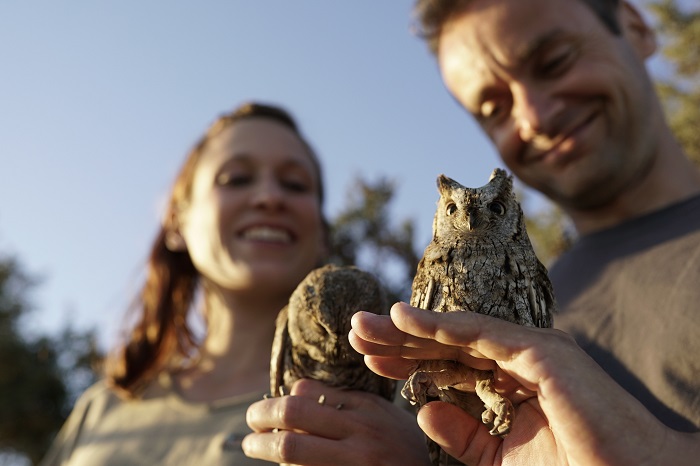
CABS is now growing at a rate as never before. With more volunteers and financial resources, the experience gained from many recent campaigns and the good reputation of our successes, we can embark on to new shores: In September 2010, our major autumn operations started on Cyprus, 2011 saw the first field operations against Ortolan poaching in France and in the same year we began our first ever bird protection camp in eastern Spain. To protect the threatened Bonelli’s Eagle from bird thieves in Sicily we began a nest watch scheme in 2012. The following year we also started an international campaign for better protection of migratory birds across the Lebanon. In 2014 we also employed a full time British conservationist as a Wildlife Crime Officer for Malta and Gozo. The permanent presence on the island has enabled us to extend our bird protection operations from 4 weeks to 18 weeks!
Some of the new success stories have come about much faster than anticipated: the theft of eggs and chicks of Bonelli’s Eagles has fallen practically to zero. Also operation on Cyprus which ramped up in 2008 have seen springtime poaching fall under more control. Particularly pleasing is the rapid decline in poaching using limesticks in the east of Spain, where we have worked alongside the authorities since 2013.
The progress being made in Malta, Cyprus, France and the Lebanon has required several years, a lot of dedicated passion and money. The circumstances are difficult and the challenges are great. Looking back of these past 40 years shows how some successes only become visible after decades of relentless work. A good example is the end of legal bird trapping in Italy, for which we have fought since 1975 and that was only made a reality in 2014. So it is perhaps too early to expect all the really drastic results to take effect in the current crisis areas. But our eyes remain on target.
But experience shows that with patience, heart and courage, you can achieve a lot for the protection of migratory birds.. and we have. As well as the drive and determination to achieve even more. In the coming years we will certainly sore into new areas. These are areas I’m sure we’ll be addressing in the 50th anniversary – in the year 2025.
In the meantime please spread the word of what we do and support us however you can with time, donations or simply support us on social media. Thank you!






